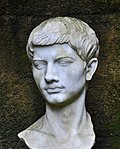Virgil
Publius Vergilius Maro (Classical Latin: [ˈpuːbliʊs wɛrˈɡɪliʊs ˈmaroː]; traditional dates 15 October 70 BC – 21 September 19 BC),[2] usually called Virgil or Vergil (/ˈvɜːrdʒɪl/ VUR-jil) in English, was a poet in the Latin language. His poems are about gods and their mythology. Virgil's most famous epic poem is called the Aeneid.
Life
Tradition is that Virgil was born in the village of Andes, near Mantua in Cisalpine Gaul.[3][4] Scholars looking at the way he used words think that he may have Etruscan, Umbrian or even a Celtic background. Study of his name has led to beliefs that his family may have been earlier Roman settlers. These modern beliefs are not supported by evidence from his own writings or from writers of his biographies. Some scholars have noted that his nickname, MARO, is an anagram of the two main themes in the Aeneid: AMOR (love) and ROMA (Rome).
Virgil Media
Modern bust of Virgil at the entrance to his crypt in Naples
Virgil's tomb in Naples, Italy
Horace, Virgil and Varius at the house of Maecenas, by Charles Jalabert
1680s illustration of a passage from the Georgics, by Jerzy Siemiginowski-Eleuter
A 1st-century terracotta expressing the pietas of Aeneas, who carries his aged father and leads his young son
Virgil Reading the Aeneid to Augustus, Octavia, and Livia by Jean-Baptiste Wicar, Art Institute of Chicago
The verse inscription at Virgil's tomb was supposedly composed by the poet himself: Mantua me genuit, Calabri rapuere, tenet nunc Parthenope. Cecini pascua, rura, duces. ("Mantua gave me life, the Calabrians took it away, Naples holds me now; I sang of pastures, farms, and commanders" [transl. Bernard Knox])
References
- ↑ Ziolkowski, Jan M. (2008). The Virgilian tradition. Yale University.
- ↑ Jones, Peter (2011). Reading Virgil: Aeneid I and II. Cambridge University Press. pp. 1, 4. ISBN 978-0521768665. Retrieved 23 November 2016.
- ↑ The epitaph on his tomb in Posilipo near Naples was Mantua me genuit; Calabri rapuere; tenet nunc Parthenope. Cecini pascua, rura, duces ("Mantua gave birth to me, the Calabrians took me, now Naples holds me; I sang of pastures [the Eclogues], country [the Georgics] and leaders [the Aeneid]").
- ↑ "Map of Cisalpine Gaul". Archived from the original on 2008-05-28. Retrieved 2009-06-01.









